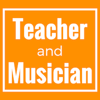Is primary the place for innovation in music?
Once in a while, something relatively small can pull together some previously diverse thoughts and put your thinking into a new context. Last week, I had one of those moments as a result of a tweet. At 140 characters, tweets are pretty small but this one only needed 125 to get me thinking about primary being a great space for innovation in music education. Here’s the tweet, posted by LJ Radick:
The more I learn about secondary whole school systems, the more I feel primary is where we can act – because we have freedom.
— LJ radick (@LjRadick) April 23, 2015
Of the threads that this pulled together for me, a few of them were:
- The finding in my recent assessment reporting survey, which suggested that primary school teachers don’t have to report levels for music
- Half of schools needing to spend time on written work in music lessons
- Never having been fully satisfied with my work in transition
- The upcoming #mufuchat on support for music in primary schools
- Conversations with Anna Gower about what a primary school version of Musical Futures could look like
- The lesson plans posted by Jackie Schneider on her blog
Pulling at strands
Every single time I had ever pulled at one of these strands in my mind, they all promptly unravelled into an incomprehensible mess. I knew that there was something important there but I couldn’t put my finger on it, so I just put it down to my secondary specialism and accepted that the primary teaching world would always know more than me on this topic (which is certainly still true!). LJ Radick’s tweet, however, made me realise that it comes down to accountability and the perceived function of music in our schools.
In many respects, secondary schools have reached a point where exam results are seen as the end game for all subjects. A subject is only as useful as its last set of GCSE results. While music may be seen to have additional benefits, it is secondary (pun only partially intended) to how the numbers look come August. The era of league tables has made certain of this. Music, just like every department, is hugely accountable for the end-of-year results. Teachers, therefore, have two choices:
- Go with methods that they are confident will produce predictable results
- Try something innovative in the hope that it will improve results
The accountability culture doesn’t exactly encourage approach two. In fact, while the rise of research influenced teaching is something that I am pleased to see, the presence of lists like the
EEF Toolkit encourage us to try something ‘safe’ rather than something truly innovative.
A win for primary and secondary?
With music not being part of the SATs system, is innovation more welcome in primary schools?
Increasingly, I’m hearing from primary school teachers who are mystified by the whole school systems surrounding music in secondary schools. These teachers get to see the power and impact of music for what it is. They don’t have to worry that the musical work produced by pupils will be subjected to a national benchmark with career changing consequences.
So, is primary the place for innovation in music? Should we try out our most outlandish ideas in an environment where risks can be taken without fear of reprisal? Can we share our best ideas with our primary colleagues in the knowledge that, if it works, secondary schools will be rewarded with better musicians? A huge part of me would like to think that this is true and that a renewed focus on primary school music will make a world of difference.
My only concern is about how this is turned into a reality. A good idea could be implemented in an over-zealous manner; just because music teaching is less accountable to the system doesn’t make it any less accountable to the pupils. An attitude of “Don’t worry, it’s only primary” would horrify me. Let’s focus on the definition of primary education that implies ‘main’ rather than just ‘first’. If we do focus our innovations in primary schools, then it needs to be done in a manner that says “This is primary, it needs to be right”.

